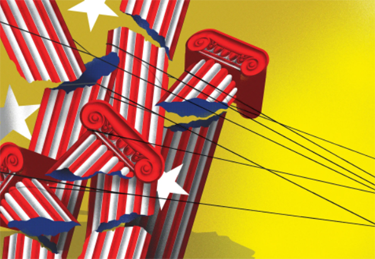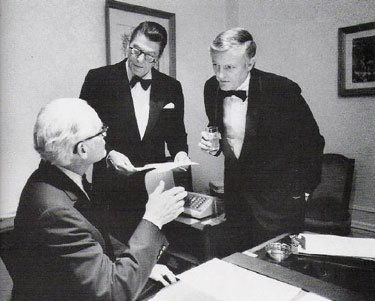Republicans have walked this tightrope for decades. When the party has integrated the issues, goals, and tactics of the New Right into its campaigns, it has been remarkably successful. Think 1968, 1972, 1980, 1984, 1994, 2010, and 2014. But there also have been signs, on the presidential level most clearly, that the alliance with populism is bringing diminishing returns. The GOP is on the brink of losing the popular vote in six out of seven presidential elections despite its current nominee running precisely the type of campaign the New Right has wanted to see for years. And this election is likely to return to office a Republican House majority that is more anti-Establishment, more hostile to compromise, more suspicious of institutions and elites than the one we have today.
This is the crisis of the conservative intellectual. After years of aligning with, trying to explain, sympathizing with the causes, and occasionally ignoring the worst aspects of populism, he finds that populism has exiled him from his political home. He finds the détente between conservatism and populism abrogated. His models—Buckley, Burnham, Will, Charles Murray, Yuval Levin—are forgotten, attacked, or ignored by a large part of the conservative infrastructure they helped to build. He finds the prospect of a reform conservatism that adds to our strengths while ameliorating our weaknesses to be remarkably dim. …
From the Panama Canal to the Tea Party, from Phyllis Schlafly to Sarah Palin, the conservative intellectual has viewed the New Right as a sometimes annoying but ultimately worthy friend. New Right activists supplied the institutions, dollars and votes that helped the conservative intellectual reform tax, crime, welfare, and legal policy. But that is no longer the case. Donald Trump was the vehicle by which the New Right went from one part of the conservative coalition to the dominant ideological tendency of the Grand Old Party. …
Trump deploys New Right symbols and tropes. His antagonism toward the Eastern establishment is obvious. …
Immigration, which emerged as a social issue at the turn of the twenty-first century, was key to Trump’s success. So was his role as outsider, independent critic of the rigged system, scold of elites, avatar of reaction. The apocalyptic predictions, the dichotomy between makers and takers, even the idea of seizing Arab territory and “taking the oil†comes straight from Bill Rusher’s 1975 Making of the New Majority Party. The relentless hostility toward the media, both liberal and heterodox conservative, the accusation that it, the government, and the financial sector is engaged in a criminal conspiracy with Hillary Clinton, the denigration of Speaker of the House Paul Ryan, the appeal to supporters of democratic socialist Bernie Sanders, the charge that the “global power structure†has “stripped†manufacturing towns “bare and raided the wealth for themselvesâ€â€”this is adversarianism in its purest, most conspiratorial, most totalistic form.
The attacks on National Review, on George Will, on conservatives with elite educations, on conservatives granted legitimacy by mainstream institutions is a replay of the New Right rhetoric of the 1970s. Names have been added to the list of Republicans in Name Only, of false, cuckolded conservatives, but the battle lines are the same. On the one hand are the effete intellectuals based on the East Coast, shuttling up and down the Acela corridor, removed from the suffering of the average American, ignorant of the social issues, amenable to social engineering, fat and happy on a diet of foundation grants, magazine sinecures, think tank projects, speaking engagements. On the other are the blue-collar radio and television hosts with million-dollar contracts, the speechwriter for Wall Street banks who uses a pseudonym to cast aspersions on the feckless conservative elite, the billionaire-supported populist website that attacks renegade Jews, the bloggers and commenters and trolls estranged from power, from influence, from notoriety, from relevance, fueled by resentment, lured by the specter of conspiracy, extrapolating terrifying and chiliastic scenarios from negative but solvable trends.
It is the same discourse, the same methods, the same antinomianism, the same reaction to demographic change and liberal overreach that we encountered in the 1970s. The difference is that Donald Trump is so noxious, so unhinged, so extremist in his rejection of democratic norms and political convention and basic manners that he has untethered the New Right politics he embodies from the descendants of William F. Buckley Jr.
The triumph of populism has left conservatism marooned, confused, uncertain, depressed, anxious, searching for a tradition, for a program, for viability. We might have to return to the beginning to understand where we have ended up.





